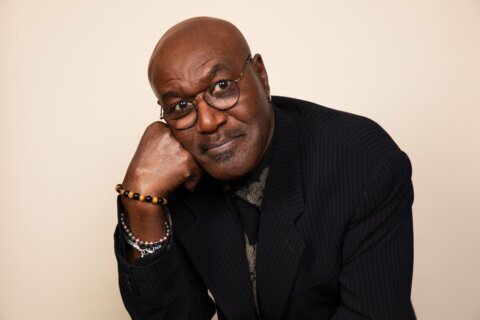Are you hoping to make this a four-day weekend to celebrate the Fourth of July?
Check out the musical revival of “1776” at the Kennedy Center now through July 16.
“Getting to perform ‘1776,’ a musical about the writing of the Declaration of Independence and the forming of a nation, to perform it in the nation’s capital on July 4, the day they signed the declaration, is awesome,” actor Shawna Hamic told WTOP. “You really can’t beat the Kennedy Center as far as an iconic location and theater.”
Based on the Tony Award-winning 1969 Broadway musical by Peter Stone (book) and Sherman Edwards (music/lyrics), the story follows the events leading up to the signing of the Declaration of Independence as John Adams tries to persuade his colleagues to vote for American independence and to sign the document.
“There’s actually quite a few themes in ‘Hamilton’ that Lin-Manuel Miranda spoke about how ‘1776’ was a huge influence on him,” Hamic said.
“I always think of ‘1776’ as a play with music. … There’s a lot of acting scenes. We actually have the historically longest book scene, which is a scene between two songs, in musical theater history, it’s 20 minutes long in Scene 3, so there’s a lot of speaking, but the music is so fantastic.”
Traditionally, the production has mostly been white men portraying the Founding Fathers with the original cast starring William Daniels as John Adams, Ken Howard as Thomas Jefferson and Howard Da Silva as Benjamin Franklin.
However, this new production has no white men in its cast to remind audiences that the Declaration of Independence did not offer equality for everyone, especially women and people of color.
“In our version here in 2023, we are a company made up fully of diverse female, trans and nonbinary actors,” Hamic said.
“You actually will not find a male-identifying person in our company, which is sometimes challenging to people, but that’s kind of the point. … It is exactly as written with one addition: we got permission to add a letter that Abigail Adams wrote to John Adams in real life called ‘Remember the Ladies.'”
Indeed, America’s founding includes a perplexing duality. On the one hand, it was a revolutionary form of government of “by the people, for the people.” On the other hand, the very leaders who promised equality were themselves slaveholders denying “life, liberty and the pursuit of happiness” to the oppressed.
“We want to remind people that every single person on that stage wasn’t thought of when the declaration was written and put into effect,” Hamic said.
“It’s a way to challenge preconceived notions of what it means to be an American, whose backs did we build it on, what have we accomplished and succeeded in writing this declaration and the promises within it, and what do we still have to work on?”
Hamic plays the role of Virginia’s founding father Richard Henry Lee, who has long been the comic relief in the stage musical, but in real life, wanted the ability to breed his enslaved people without being taxed on it.
“I never learned in school that there was a clause in the declaration that would have removed slavery,” Hamic said.
“It became a point of contention between the North and South, and because this decision had to be unanimous for the 13 colonies to agree to break away from Great Britain and become our own country, people had to give up things that were very important socially. The biggest was the removal of slavery.”
In the end, she hopes that audiences walk away with more than just blind patriotism, but rather a more realistic, clear-eyed understanding of an imperfect nation that is still working to improve itself.
“A lot of people would like to think of America as this shining beacon, and it is in a great many ways, but what we have to realize is that we are not perfect,” Hamic said.
“We hold these Founding Fathers in such high regard that they’ve almost become semi-deities, they couldn’t possibly have been less than perfect because look at what they accomplished! But they accomplished this wonderful creation of a nation by disregarding others.”
Listen to our full conversation here.








